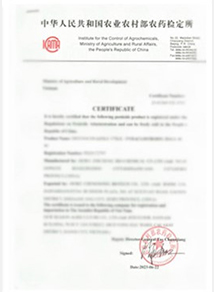
Des . 01, 2024 03:37 Back to list
Selective Herbicides for Bean Cultivation and Effective Weed Management Strategies
Understanding Beans and Selective Herbicides A Sustainable Approach to Crop Management
Beans are an essential staple crop consumed worldwide, appreciated for their protein content, fiber, and versatility in various culinary applications. As demand for beans continues to grow, so does the need for effective agricultural practices to ensure high yields and quality. One of the critical aspects of modern bean cultivation is the use of selective herbicides. These chemicals play a vital role in weed management, allowing farmers to protect their crops while minimizing environmental impact.
Selective herbicides are designed to target specific weed species without affecting the desired crop, such as beans. This selective action is crucial, as weeds can compete with bean plants for nutrients, water, and sunlight, often leading to reduced crop yields. By using selective herbicides, farmers can maintain crop health and maximize productivity while reducing the reliance on more broad-spectrum chemicals that can harm both the ecosystem and beneficial organisms.
The Importance of Integrated Weed Management
While selective herbicides offer several advantages, they should be part of an Integrated Weed Management (IWM) strategy. IWM combines cultural, mechanical, and chemical tactics to control weeds effectively and sustainably. For instance, crop rotation, planting cover crops, and implementing good agricultural practices can reduce weed pressure and enhance soil health.
Combining these methods with the strategic application of selective herbicides allows farmers to rely less on chemicals over time. This not only helps in managing herbicide resistance—an increasing concern in agricultural communities—but also protects beneficial insects and pollinators that are often negatively impacted by broader herbicide use.
Challenges and Considerations
beans selective herbicide

Despite the benefits of selective herbicides, challenges remain. One significant issue is the development of herbicide-resistant weed populations. As some weeds evolve to tolerate specific herbicides, their proliferation can lead to reduced effectiveness and increased cost for farmers. To combat this, rotating herbicides with different modes of action and employing non-chemical control methods is vital.
Additionally, farmers must consider the environmental impact of herbicides. Even selective herbicides can drift off-target and affect surrounding flora and fauna. This concern has led to the development of innovative application technologies, such as precision application systems that minimize off-target movement and enhance the efficiency of herbicide use.
Future Directions in Herbicide Use
The future of selective herbicide use in bean cultivation lies in advancing agricultural technology and practices. Research is ongoing to develop new herbicides that are effective yet pose minimal risk to the environment. Moreover, the advent of genetically modified (GM) beans offers new possibilities in weed management. For example, certain GM bean varieties are engineered to tolerate specific herbicides, allowing for more effective weed control without harming the crop.
Furthermore, precision agriculture technologies, including drones, satellite imagery, and soil sensors, can help identify weed populations and optimize herbicide application timing and dosage. These tools enable farmers to make data-driven decisions that promote both crop health and environmental sustainability.
Conclusion
In conclusion, the use of selective herbicides in bean cultivation is a crucial component of modern agricultural practices. When integrated into a broader IWM strategy, these herbicides can enhance crop yields, reduce competition from weeds, and support sustainable farming. While challenges such as herbicide resistance and environmental impact persist, ongoing research and technological advancements hold promise for improving herbicide efficacy and sustainability in bean agriculture. As we strive for a future of more sustainable and resilient food systems, the careful management of weeds through selective herbicides will undoubtedly play a pivotal role in ensuring food security and environmental conservation.
-
Herbicide Mesotrione: Advanced Herbicide Solutions for Corn Field Weed Control
NewsJul.12,2025
-
Buy Penoxsulam Herbicide - Selective Weed Control Solution for Lawns & Crops
NewsJul.08,2025
-
Malathion and White Oil Effective Insecticide for Citrus & Ornamentals
NewsJul.08,2025
-
Best Section Fungicide Solutions Effective Carbendazim & Copper Fungicides for Citrus Trees
NewsJul.08,2025
-
Types of Herbicides Explained Discover 5 Types of Selective Herbicides for Effective Weed Control
NewsJul.07,2025
-
Buy Bifen Chemical – Safe Termiticide for Dogs & Effective Pest Control Solutions
NewsJul.07,2025
